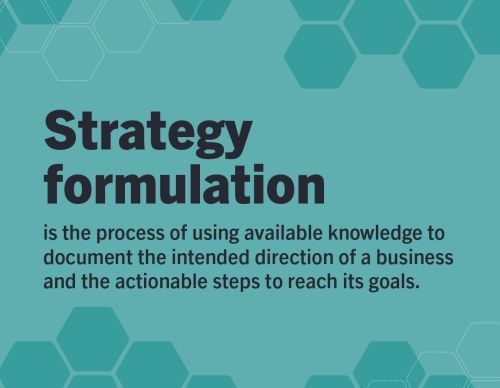Formulating Business Strategies
Formulating effective business strategies is crucial for the  success and growth of your enterprise.
success and growth of your enterprise.
A well-thought-out strategy provides direction, helps you make informed decisions, and maximizes your chances of achieving your business goals. Here are the key steps in formulating your business strategies:
Define Your Vision and Mission:
Start by clearly articulating your business’s vision and mission. Your vision outlines where you want your business to be in the future, while your mission defines its purpose and core values. These statements will serve as the foundation for your strategies.
SWOT Analysis:
Conduct a SWOT analysis (Strengths, Weaknesses, Opportunities, and Threats) to assess your business’s current position. Identify your strengths and weaknesses, as well as external opportunities and threats. This analysis will help you understand your competitive landscape.
Set SMART Goals:
Define specific, measurable, achievable, relevant, and time-bound (SMART) goals. Your goals should align with your vision and mission and provide a clear direction for your strategies. For example, you might set a goal to increase revenue by 20% within the next year.
Identify Target Markets:
Determine your target markets and customer segments. Understand their needs, preferences, and pain points. Tailoring your strategies to your target audience is essential for success.
Competitive Analysis:
Analyze your competitors to gain insights into their strengths and weaknesses. Identify gaps in the market that your business can address. Differentiate your offerings to stand out in the marketplace.
Product or Service Development:
Define your product or service offerings and how they meet customer needs. Consider product improvements, innovations, or diversification to stay competitive and meet changing market demands.
Marketing and Promotion:
Develop a marketing strategy that includes your pricing, distribution, and promotional efforts. Consider digital marketing, social media, content marketing, and other channels to reach and engage your target audience.
Operational Strategies:
Create operational strategies that optimize your internal processes, reduce costs, and enhance efficiency. This may involve streamlining supply chains, improving inventory management, or adopting new technologies.
Financial Planning:
Develop a financial strategy that outlines your budget, revenue projections, and cash flow management. Ensure your financial resources align with your business goals.
Risk Management:
Identify potential risks and develop risk mitigation strategies. This includes financial risks, market fluctuations, and unforeseen challenges like pandemics or natural disasters.
Monitoring and Evaluation:
Implement key performance indicators (KPIs) to measure the effectiveness of your strategies. Regularly monitor and evaluate your progress toward your goals and be prepared to adjust your strategies as needed.
Execution and Implementation:
Finally, put your strategies into action. Assign responsibilities, allocate resources, and ensure everyone in your organization understands their role in executing the plan.
Remember that business strategy formulation is an ongoing process. Markets evolve, customer preferences change, and new opportunities arise. Regularly revisit and adapt your strategies to stay competitive and achieve long-term success.




This Post Has 0 Comments